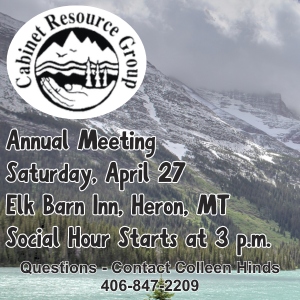Everyone's an expert
April 16, 2020
Just over the hill from Sanders County, a Washington gubernatorial candidate recently declared Governor Inslee’s business closures “unconstitutional.” My initial reaction was to assume this labeling was made-for-TV campaign rhetoric that might fizzle away in another week or two, probably harmless, and instead of chewing on it, I should chew peacefully on my breakfast bagel.
But over the past forty years or so I’ve heard the words “unconstitutional” and “constitutional” so many times from so many seemingly unqualified voices that I’ve become strangely sensitive (perhaps neurotic) about their use. That’s because it seems as if people using those two words in public discourse have proliferated in quantities and effects normally associated with 10-pound bags of pinto beans, and I can’t help wondering, “Where did all of these constitutional scholars come from?”
I don’t remember ever hearing my parents or relatives – all of them patriotic, traditionally conservative, tax-paying, God-fearing, hard-working, etc. – pretending they knew the Constitution well enough to define its terms for others, nor to use snippets of it as evidence for their political ponderings.
The King James Bible, yes. But not the Constitution.
True, it’s possible that even hampered with Rude DNA, any citizen of average intelligence, some reading skill and some spare evenings could master the thousands of pages of constitutional foundations and interpretations written by some of the best legal minds of Western Civilization dating back to Anglo-Saxon or even Aristotle’s days, and could thus become a constitutional expert.
Possible, but not real likely.
When I think of a constitutional expert, I think of someone such as Barack Obama, or our Supreme Court justices. Yet even with all their knowledge, these lofty intellects are not immune to putting their own spin on the document. So what are we to make of the more earthly citizen who, without such knowledge, insists he has the absolute interpretation, and that his interpretation just happens to substantiate his political theorizing?
Call me skeptical.
If a candidate were to say, “Closing businesses could be unconstitutional, and I prefer a Supreme Court affirmation of such action before implementing it,” I would think it a valid approach to the issue. But given the questionable motives of so many voices, arbitrary use of the word “unconstitutional” by itself seems more a call to rally gullible voters than a call to initiate reasoned analysis of a legitimate legal question.
The Constitution is a type of contract, one which speaks in relatively plain language about profoundly complex human interactions, and people who work with contracts in any form know how tricky contract language can be. The Constitution’s framers were wise and articulate fellows; despite the arduous word-by-word labors required for precise contract language, they did choose to write the thing down and to sign it, thus memorializing the philosophic, legal, and linguistic complexities as well as their own responsibility for the document. Only then did they make it public, a priceless gift to free people of all time. But within it they created a system whereby only the most learned would decide in final definition what is constitutional and what is not. They knew that unleashing the personal interpretations of Tom, Dick and Harry could be divisive, even dangerous, as likely to rouse the rabble as to encourage solidarity of a nation.
During a national crisis, fomenting resistance to a temporary, common-sense directive from duly elected authority is divisive, even though the directive may be uncomfortable or even frightening. It’s like a COVID-19 patient demonizing a doctor who insists the patient remain quarantined. It is not a fair tactic for Tom, Dick or Harry to make political hay.
Ron Rude,
Plains




Reader Comments(0)